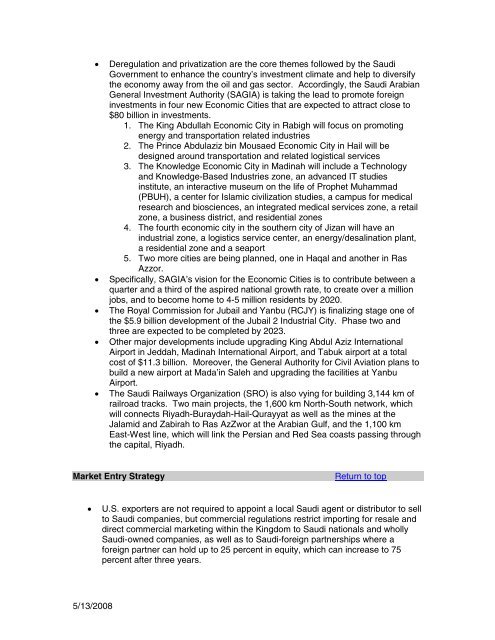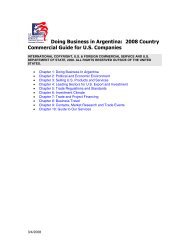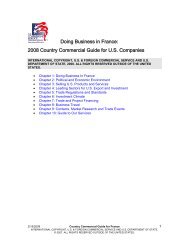Doing Business In Saudi Arabia - Bna
Doing Business In Saudi Arabia - Bna
Doing Business In Saudi Arabia - Bna
You also want an ePaper? Increase the reach of your titles
YUMPU automatically turns print PDFs into web optimized ePapers that Google loves.
5/13/2008<br />
Deregulation and privatization are the core themes followed by the <strong>Saudi</strong><br />
Government to enhance the country’s investment climate and help to diversify<br />
the economy away from the oil and gas sector. Accordingly, the <strong>Saudi</strong> <strong>Arabia</strong>n<br />
General <strong>In</strong>vestment Authority (SAGIA) is taking the lead to promote foreign<br />
investments in four new Economic Cities that are expected to attract close to<br />
$80 billion in investments.<br />
1. The King Abdullah Economic City in Rabigh will focus on promoting<br />
energy and transportation related industries<br />
2. The Prince Abdulaziz bin Mousaed Economic City in Hail will be<br />
designed around transportation and related logistical services<br />
3. The Knowledge Economic City in Madinah will include a Technology<br />
and Knowledge-Based <strong>In</strong>dustries zone, an advanced IT studies<br />
institute, an interactive museum on the life of Prophet Muhammad<br />
(PBUH), a center for Islamic civilization studies, a campus for medical<br />
research and biosciences, an integrated medical services zone, a retail<br />
zone, a business district, and residential zones<br />
4. The fourth economic city in the southern city of Jizan will have an<br />
industrial zone, a logistics service center, an energy/desalination plant,<br />
a residential zone and a seaport<br />
5. Two more cities are being planned, one in Haqal and another in Ras<br />
Azzor.<br />
Specifically, SAGIA’s vision for the Economic Cities is to contribute between a<br />
quarter and a third of the aspired national growth rate, to create over a million<br />
jobs, and to become home to 4-5 million residents by 2020.<br />
The Royal Commission for Jubail and Yanbu (RCJY) is finalizing stage one of<br />
the $5.9 billion development of the Jubail 2 <strong>In</strong>dustrial City. Phase two and<br />
three are expected to be completed by 2023.<br />
Other major developments include upgrading King Abdul Aziz <strong>In</strong>ternational<br />
Airport in Jeddah, Madinah <strong>In</strong>ternational Airport, and Tabuk airport at a total<br />
cost of $11.3 billion. Moreover, the General Authority for Civil Aviation plans to<br />
build a new airport at Mada’in Saleh and upgrading the facilities at Yanbu<br />
Airport.<br />
The <strong>Saudi</strong> Railways Organization (SRO) is also vying for building 3,144 km of<br />
railroad tracks. Two main projects, the 1,600 km North-South network, which<br />
will connects Riyadh-Buraydah-Hail-Qurayyat as well as the mines at the<br />
Jalamid and Zabirah to Ras AzZwor at the <strong>Arabia</strong>n Gulf, and the 1,100 km<br />
East-West line, which will link the Persian and Red Sea coasts passing through<br />
the capital, Riyadh.<br />
Market Entry Strategy Return to top<br />
U.S. exporters are not required to appoint a local <strong>Saudi</strong> agent or distributor to sell<br />
to <strong>Saudi</strong> companies, but commercial regulations restrict importing for resale and<br />
direct commercial marketing within the Kingdom to <strong>Saudi</strong> nationals and wholly<br />
<strong>Saudi</strong>-owned companies, as well as to <strong>Saudi</strong>-foreign partnerships where a<br />
foreign partner can hold up to 25 percent in equity, which can increase to 75<br />
percent after three years.












